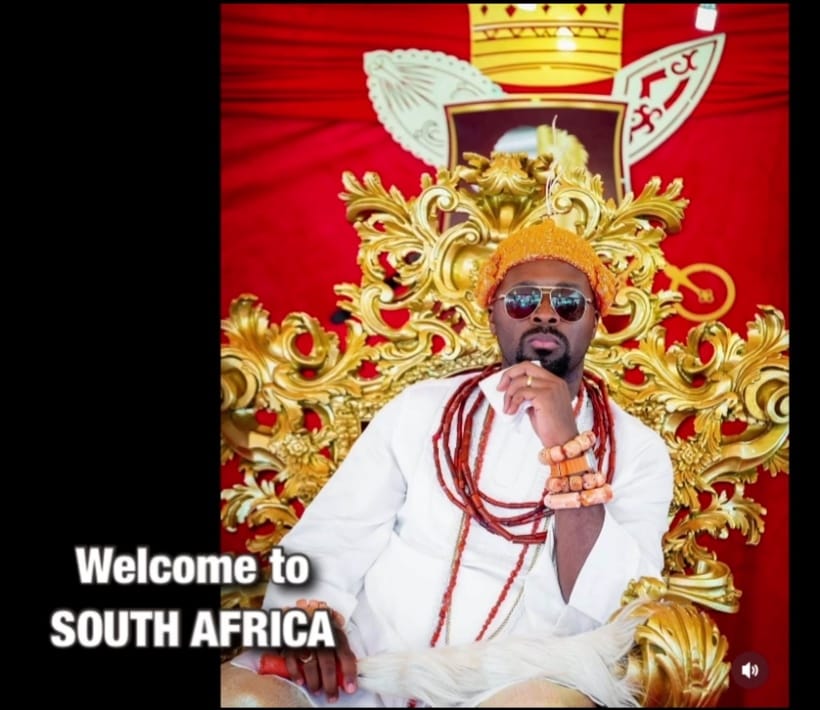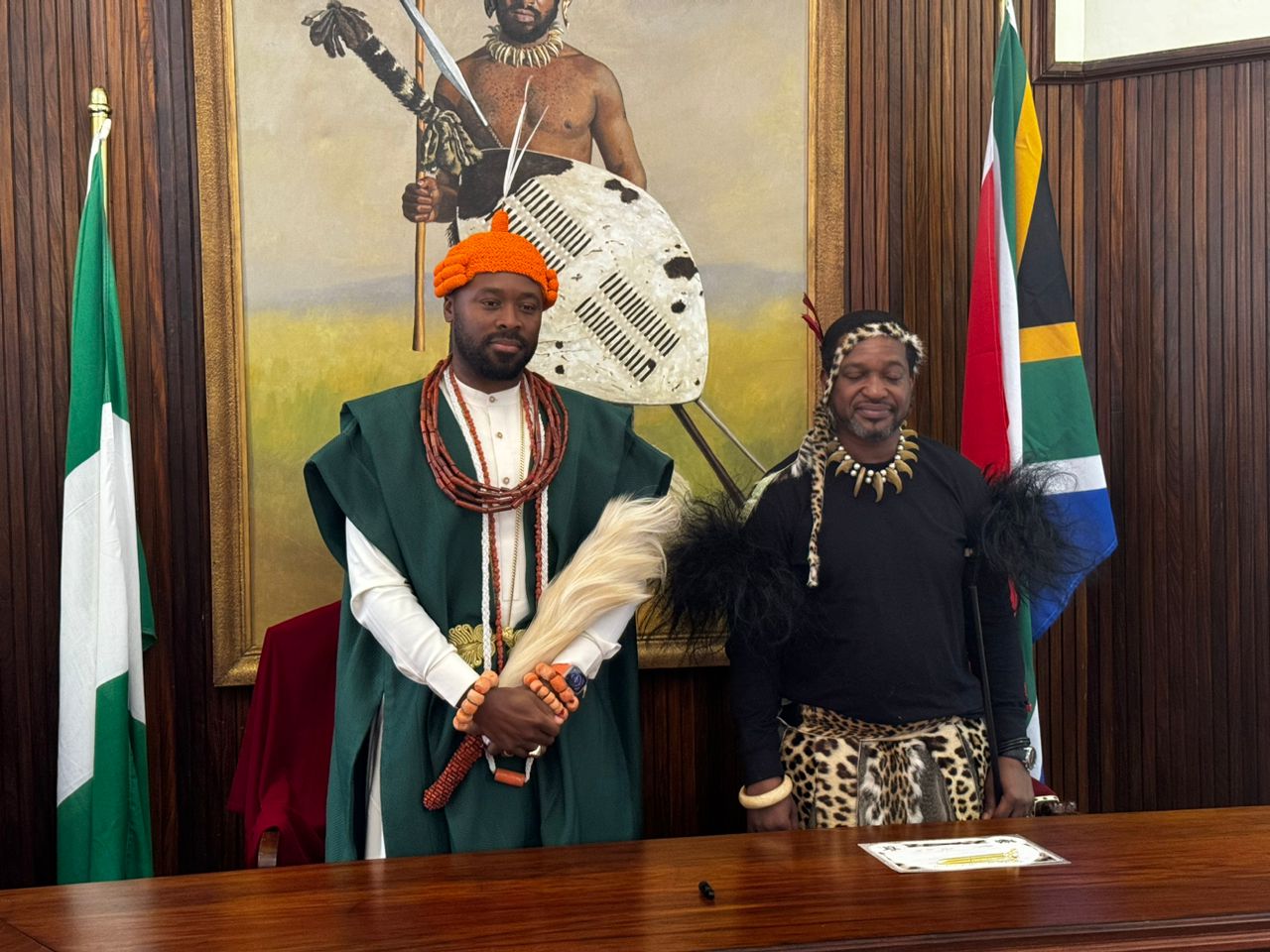Royal Alliance for African Renaissance: King Misuzulu Hosts Ògíamè Atúwàtse III at KwaKhangelamankengane
On the 16th of May 2025, a monumental event in the chronicles of pan-African unity unfolded at the KwaKhangelamankengane Royal Palace in KwaNongoma, northern KwaZulu-Natal, South Africa. His Majesty King Misuzulu kaZwelithini, the reigning monarch of the Zulu nation, hosted His Imperial Majesty Ògíamè Atúwàtse III, CFR, the 21st Olú of Warri Kingdom in Nigeria, in a ceremonious and culturally rich royal engagement that symbolized not only a diplomatic alliance but a rekindling of historical ties between two of Africa’s most formidable monarchies.

This visit, though described by some as ceremonial, was in fact deeply strategic and historic. It was an intersection of legacies, Zulu valor and Warri nobility, an alliance of thrones rooted in precolonial African greatness, spiritual authority and sovereign dignity.
Reconnecting the Royal Dots Across Africa

To fully appreciate the depth of this meeting, one must understand the weight each monarch carries. The Zulu Kingdom, under the lineage of Shaka Zulu and the late King Goodwill Zwelithini kaBhekuzulu, has long been the bastion of cultural pride, warrior resistance and leadership within southern Africa. The ascension of King Misuzulu kaZwelithini in 2021 marked a renewal of traditional leadership that resonates beyond South Africa.

Similarly, the Warri Kingdom, situated in the oil-rich Niger Delta of Nigeria, dates back to the late 15th century and is revered for its early adoption of diplomacy, Christianity and international relations, especially with the Portuguese. The current Olú, Ògíamè Atúwàtse III, who ascended the throne in August 2021, has transformed the narrative around traditional leadership in West Africa. Harvard-educated and forward-thinking, he combines ancient wisdom with global intellect to promote cultural revival, education, peace and pan-African solidarity.
According to Prof. Adeyemi Okunlola, a scholar of African monarchies, “When two thrones that stood firm through the storms of colonialism meet, it is not a coincidence but a prophecy manifest. This meeting is the spiritual and political awakening Africa needs.”

Pan-Africanism at the Level of Kings
In an era where Africa continues to grapple with neocolonial economic systems, fractured borders and leadership crises, this royal interaction sends a resounding message: Africa’s kings are not relics; they are pillars of identity, unity and hope.
Addressing the gathered elders, chiefs, diplomats and traditional dancers at KwaKhangelamankengane Palace, King Misuzulu emphasized the importance of unity among African nations and the role traditional leaders must play in shaping the continent’s destiny.
“We are not just here to exchange pleasantries,” King Misuzulu declared. “We are here to reconnect the broken bones of our continent, to renew bonds that colonizers tried to erase, and to build a new Africa from the roots.”
In response, Ògíamè Atúwàtse III offered profound insights into the spiritual and developmental duties of traditional rulers in the 21st century:
“We are custodians of both the past and the future. Africa does not lack resources; it lacks alignment and consciousness. Our thrones are not decorative, they are directional. From KwaZulu to Warri, the drumbeat of unity is louder than ever.”
These were not hollow words. Both monarchs have walked the talk. King Misuzulu has championed rural development, youth empowerment and land reform advocacy. Meanwhile, Ògíamè Atúwàtse III has restructured the Itsekiri Royal Court to include technocrats, diplomats and professionals, modernizing governance in a way that benefits his people without losing cultural identity.
Cultural Diplomacy as a Tool for African Integration
While Western diplomacy is often obsessed with trade, military alliances and economic metrics, Africa’s diplomacy has always started with relationships, respect, rituals and reciprocity.
The Zulu-Warri encounter was steeped in symbolism, royal greetings, traditional drumming, libations, gift exchanges and storytelling. Cultural exchange is not merely aesthetic; it is the most authentic African foreign policy model. As Chinua Achebe once said, “A man who does not know where the rain began to beat him cannot say where he dried his body.” This visit reminds Africans of where the rain began and inspires a future where they collectively seek shelter under the same ancestral umbrella.
This is especially important at a time when xenophobia, regional distrust and tribal divisions continue to plague African societies. The meeting of these two monarchs stands in sharp contrast to the rising tide of anti-African sentiment in South Africa. In fact, the warm embrace of Ògíamè Atúwàtse III by King Misuzulu stands as a royal rebuke to xenophobic politicians who preach division rather than unity.
Strategic Importance in 2025 and Beyond
2025 marks a critical juncture in Africa’s development. The African Continental Free Trade Agreement (AfCFTA) is still in its fragile implementation phase. Continental security is threatened by insurgencies in the Sahel, political instability in West Africa and socio-economic discontent across southern Africa. In such times, state institutions have largely failed, but traditional institutions have endured.
In the words of Prof. Thabo Moletsane, a leading South African political anthropologist, “Where presidents fail, kings remain. Africa’s future will not only be determined in parliaments and boardrooms, it will be shaped in palaces.”
The presence of the Olú of Warri in KwaZulu-Natal thus transcends tourism or courtesy, but a bold move to reassert indigenous leadership as a legitimate and critical stakeholder in Africa’s future. It is a reminder that while colonial borders may divide, ancestral allegiance unites.
Beyond Symbolism: Pathways to Collaboration
The visit also paved the way for collaborative development. Sources close to both royal courts have hinted at plans to explore partnerships in education, agriculture, cultural tourism and youth exchange programs. Ògíamè Atúwàtse III’s Royal Iwere Foundation and King Misuzulu’s development initiatives could form the backbone of a new pan-African model of grassroots progress, outside the bureaucracy and corruption that have riddled many state institutions.
This kind of bottom-up cooperation mirrors the wisdom of the African proverb: “When spider webs unite, they can tie up a lion.” In unity, African kingdoms can do more than survive; they can lead.
The Rise of a New Royal Order
As King Misuzulu and Ògíamè Atúwàtse III embraced, the symbolism was undeniable. It was a spiritual handshake that traversed time and space. It was a reminder that Africa’s true strength lies in its roots, in its royal families, in its cultural institutions and in the unity of its people.
We live in a continent where many leaders seek validation in Washington, Paris or Beijing. Yet, here we have two kings seeking validation in each other’s ancestral lineage, a far more powerful gesture that echoes the words of Kwame Nkrumah: “We face neither East nor West, we face forward.”
This encounter must not be buried in the back pages of history. It must be celebrated, studied and replicated. From the swamps of Warri to the hills of KwaZulu, a new Africa is rising, not from politics, but from purpose; not from presidents, but from palaces.







Author: George Omagbemi Sylvester
Date: May 16, 2025
Location: KwaNongoma, KwaZulu-Natal, South Africa


 society5 months ago
society5 months ago
 Entertainment5 months ago
Entertainment5 months ago
 celebrity radar - gossips6 months ago
celebrity radar - gossips6 months ago
 celebrity radar - gossips4 months ago
celebrity radar - gossips4 months ago
























